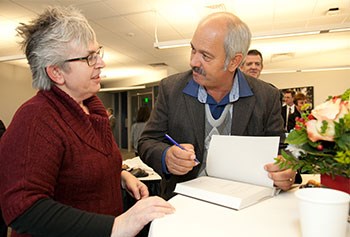Story of Loyalty, Mutual Respect Published

12/10/2014
By Sheila Eppolito
Christo Brand may have grown up in South Africa during the height of the apartheid government, but he didn’t know much about it until he needed a restroom in Cape Town.
“I grew up on a farm, and counted black boys among my friends. All media was censored by the government, so we didn’t know about the racism and protests in the cities,” said Brand, who spoke about his book, “Mandela: My Prisoner, My Friend” to a crowd of students, faculty, staff and community members at University Crossing.
Brand’s family moved to the city after his dad’s job loss, and one day, in need of facilities, he saw a sign warning black people not to use one restroom, and directing them to another.
“I had to go look at the other bathroom. I couldn’t imagine what the difference could possibly be between the two,” he said.
Brand ultimately learned about apartheid and its consequences firsthand, from one of the world’s most high-profile protestors, Nelson Mandela, who was first his prisoner, and later his unlikely friend.
Like all white males of the time, Brand was forced to serve the government — either in the armed forces, or in the prison system. After his best friend was killed while in the army, he decided to work in the prisons.
At just 19, Brand was dispatched by ferry to the infamous Robben Island. The other guards warned young Brand against talking to the prisoners, telling him, “These men are terrorists and they are killing our children.”
Brand, though, experienced something very different with the prisoners to whom he was assigned.
“They were all old, and polite, and they studied all the time,” he said.
His prisoners may have been old, but they were also well known — Nelson Mandela and the others were convicted at the famous Rivonia Trial where leaders of the African National Congress (ANC) were charged for their anti-apartheid activities.
In Brand’s first meeting with Mandela, the two shared their love of gardening.
“Mr. Mandela was respectful to me, his jailer, calling me Mr. Brand. He was that way with everyone,” said Brand.
Over the years on Robben Island, and then, later at Pollsmoor Prison, Brand and Mandela became close, like father and son. In his book, Brand recounts scouring Cape Town for the Pantene hair gel Mandela used daily – no small task given the economic sanctions against South Africa at that time.
Mandela took an interest in Brand’s family, especially regarding academics – writing to Brand’s son about his college plans and Brand’s wife with the suggestion she pressure her husband to study and learn, too.
The two enjoyed a relationship that defies the normal jailer/prisoner model, with Brand often silently alerting Mandela to the bugs he wore to record the ANC leader’s conversations for the government, and, in an astounding act of compassion, allowing Mandela to hold the granddaughter Winnie Mandela had smuggled onto the island against prison rules.
“I locked Winnie in one room — she couldn’t know what I was doing, or she might have said something to the media — and I demanded the baby from her,” said Brand.
Brand then brought the baby to Mandela, who, he said, “cried two tears onto the sleeping baby’s cheek before she opened just one eye.”
The relationship between Brand and Mandela remained solid even after his release, continuing until Mandela’s death.
“After my own father died in 1996, I would call Mandela about any problem,” said Brand.
Indeed, the day after Mandela’s release, Brand received a call at home from him.
“He called to thank me for how I treated him. I couldn’t believe that with the whole world wanting to talk to him, he took time to call me,” said Brand.
Before his death, Mandela pushed Brand to write their story, sending an agent with a contract to move things along. Brand has made good on his promise.
After his talk at University Crossing, audience members asked him about his impressions of America.
In the final question of the evening, Brand was asked what Mandela would do in the wake of the Ferguson riots.
“He would bring down the smoke, and put up the skies – nobody should lose their child, and this family needs to know their son did not die in vain. Now is the time to gather the families, call all the parties to talk and listen: This is not the time for more violence, it is a time for reconciliation.”
The crowd at University Crossing agreed, giving Brand a standing ovation.
Christo Brand’s book is available at the River Hawk Shop at University Crossing.
